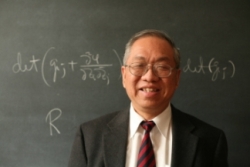Shing-Tung Yau

Shing-Tung Yau was born in 1949 in Shantou, (Guandong Province) China. His family soon moved to Hongkong. When he was 14 years old his father died. Shing-Tung Yau studied first in Hongkong (1966-1969) and then in Berkeley, where in 2 years he completed his Ph.D. with Shiing-Shen Chern as his supervisor. In the next few years he worked in the Institute for Advanced Studies in Princeton, State University of New York (Stony Brook) and Stanford University. In 1982 Shing-Tung Yau was awarded with the Fields Medal for "his contributions to partial differential equations, to the Calabi conjecture in algebraic geometry, to the positive mass conjecture of general relativity theory, and to real and complex Monge-Ampère equations". Since 1987 he has been a professor at Harvard University.
Solving the complex Monge-Ampère equation on compact Kähler manifolds S.-T. Yau proved the long standing Calabi conjecture. The solution provides canonical metrics (Kähler-Einstein, Ricci-flat) in a given characteristic class on a manifold. In the case of positive first Chern class Kähler-Einstein metrics may not exist. The result known as Donaldson-Uhlenbeck-Yau theorem relates the stability of holomorphic vector bundles to the existence of a Hermitian-Yang-Mills metrics. The Calabi-Yau theorem has far reaching consequences in algebraic geometry and modern physics, where, in string theory the Calabi-Yau manifolds play a key role. A lot of activity of S.-T. Yau and his students still concentrates on problems originating from string theory. The explicit constructions of mirror manifolds go under the name of the Strominger-Yau-Zaslow program. R. Schoen and S.-T. Yau proved the positive mass conjecture which says that the total mass in general relativity is positive. This is yet another example of powerful application of geometry, minimal surfaces in particular, in mathematical physics.
S.-T. Yau received numerous honorary degrees and profesorships. The list of his awards and prizes includes the Fields Medal, Crafoord Prize (1994), United States National Medal of Science (1997) and, most recent, Wolf Prize in Mathematics (2010).
- treść:
- Agnieszka Deszyńska
- kod:
- edytor:
- aktualizacja:
- Śr, 05 maj 2010 14:54:23 +0000